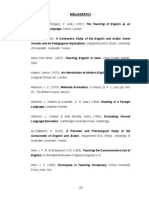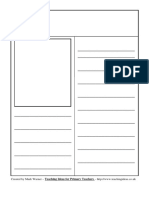TEFL: Bibliography: ND ND
TEFL: Bibliography: ND ND
Uploaded by
Olga KardashCopyright:
Available Formats
TEFL: Bibliography: ND ND
TEFL: Bibliography: ND ND
Uploaded by
Olga KardashOriginal Title
Copyright
Available Formats
Share this document
Did you find this document useful?
Is this content inappropriate?
Copyright:
Available Formats
TEFL: Bibliography: ND ND
TEFL: Bibliography: ND ND
Uploaded by
Olga KardashCopyright:
Available Formats
TEFL: Bibliography
Bryson, B. The Mother Tongue: English & How It Got That Way. Morrow 1990.
Cowan, R. The Teacher’s Grammar of English. Cambridge, 2008.
Cross, K.P. Adults as Learners: Increasing Participation and Facilitating Learning. Jossey-Bass,
1981.
Dow, R.A. Learning Through Encounter. Judson Press, 1971.
Gurian, M. et.al. Boys and Girls Learn Differently: A Guide for Teachers and Parents.
Jossey-Bass, 2001. 2nd Rev. Ed. 2011.
Guth, H.P. & G.L. Rico. Discovering Literature: Stories, Poems, Plays. 2nd. Ed. Blair Press,
Prentice Hall, 1997.
Hall, E.T. The Silent Language. Anchor books, 1959.
Hiebert, P.G. Cultural Anthropology. 2nd Ed. Baker Book House, 1983.
Judson, H.F. The Search for Solutions. Holt, Rinehart & Winston. 1980.
Knowles, M.S. The Modern Practice of Adult Education: From Pedagogy to Andragogy. Rev. Ed.
Cambridge Prentice Hall, 1980.
Levine, M. A Mind at a Time. Simon & Schuster, 2002.
Lightbown, P.M. & N. Spada. How Languages Are Learned. 4th Ed. Oxford, 2013
Marsh, P. ed. Eye to Eye: How People Interact. Salem House, 1988.
Nisbett, R.E. The Geography of Thought: How Asians and Westerners Think Differently…and
Why. The Free Press, 2003.
Orlova, N. English for Psychology Students. Cherkasy, 2010.
Ovando, C.J., et. al. Bilingual and ESL Classrooms: Teaching in Multicultural Contexts. McGraw
Hill. 4th Ed. 2006.
Petroski, H. To Engineer Is Human: The Role of Failure in Successful Design. Vintage, 1982.
Postman, N. & C. Weingartner. Teaching as a Subversive Activity. Delta, 1969.
Sanders, N.M. Classroom Questions: What Kinds? Harper & Row, 1966.
Schultz, E.A. & R.H. Lavenda. Anthropology: A Perspective on the Human Condition. Mayfield
Pub. Co., 2001.
Turkle, S. Alone together: Why We Expect More from technology and Less from Each Other.
Basic books, 2011.
Wilde, S. What’s a Shewa Sound Anyway?: A Holistic Guide to Phonetics, Phonics, and Spelling.
Heinemann, 1997.
You might also like
- References: Chen, B.B. (2004) - A Survey On Cultural Learning and Its Variables Analysis. Xi'anDocument55 pagesReferences: Chen, B.B. (2004) - A Survey On Cultural Learning and Its Variables Analysis. Xi'anNo nameNo ratings yet
- Celtyl and Yl Extension Book ListDocument4 pagesCeltyl and Yl Extension Book Listʚϊɞ Sarah Omar ʚϊɞNo ratings yet
- UC Rhetoric and Composition Qualifying Exam Provisional Bibliography (Adapted With Permission From The University of Alabama Program)Document24 pagesUC Rhetoric and Composition Qualifying Exam Provisional Bibliography (Adapted With Permission From The University of Alabama Program)A KaNo ratings yet
- General Reference List: 1 Principles of English TeachingDocument17 pagesGeneral Reference List: 1 Principles of English TeachingMargaret DinhNo ratings yet
- How Languages Are Learned-BibliographyDocument1 pageHow Languages Are Learned-BibliographyOlga KardashNo ratings yet
- Young Learners 2014: Foreign Language, 4th Ed., Heinle ELTDocument2 pagesYoung Learners 2014: Foreign Language, 4th Ed., Heinle ELTMilica PetrovićNo ratings yet
- Linguistics Reading List For TESLDocument16 pagesLinguistics Reading List For TESLNina Wara Manjón CuetoNo ratings yet
- ReferencesDocument3 pagesReferencesIlhamYuandokoNo ratings yet
- Asset-V1 PennX+UCI1x+3T2017+type@asset+block@References For Understanding Classroom InteractionDocument8 pagesAsset-V1 PennX+UCI1x+3T2017+type@asset+block@References For Understanding Classroom InteractionCBRNo ratings yet
- Daftar PustakaDocument3 pagesDaftar PustakaLilik PurwaningsihNo ratings yet
- Reference PageDocument4 pagesReference Pageapi-300865522No ratings yet
- Bibliography: Practice. Newyork: LongmanDocument3 pagesBibliography: Practice. Newyork: LongmanLuphy CHe BungZuNo ratings yet
- The Reading Teacher, 67, 2013: Daftar PustakaDocument2 pagesThe Reading Teacher, 67, 2013: Daftar PustakaIndahnya BerbagiNo ratings yet
- Approved Textbooks First Year Comp 2011Document6 pagesApproved Textbooks First Year Comp 2011aharish_iitkNo ratings yet
- Works Cited Educ 302Document1 pageWorks Cited Educ 302api-338231293No ratings yet
- Daftar PustakaDocument4 pagesDaftar PustakadannaNo ratings yet
- 06 BackDocument17 pages06 BackBionick CharlesNo ratings yet
- BA Final Exam Reading ListDocument3 pagesBA Final Exam Reading Listsanroge94No ratings yet
- BibliographyDocument2 pagesBibliographyMarinescu RamonaNo ratings yet
- Bibliografi Reading ComprehensionDocument2 pagesBibliografi Reading ComprehensionApis AjahNo ratings yet
- Reference PageDocument3 pagesReference Pageapi-285008589No ratings yet
- DAFTAR PUSTAKA Desertasi AnggiDocument7 pagesDAFTAR PUSTAKA Desertasi AnggiKiki Nur Ambar AhyaniNo ratings yet
- Book ListDocument53 pagesBook Listfilologic0% (1)
- References: Phonology Lab Annual Report (2009)Document7 pagesReferences: Phonology Lab Annual Report (2009)Jarallah Ali JarallahNo ratings yet
- REFERENCESDocument2 pagesREFERENCESElliot AlxNo ratings yet
- Orality and Literacy, Reading Suggestions-1Document2 pagesOrality and Literacy, Reading Suggestions-1Claudia ToiaNo ratings yet
- Biliography by TopicsDocument13 pagesBiliography by TopicsangelNo ratings yet
- Cazden Courtney CVDocument12 pagesCazden Courtney CVapi-248257167No ratings yet
- References: Evaluating Quantitative and Qualitative Research. USA: PearsonDocument3 pagesReferences: Evaluating Quantitative and Qualitative Research. USA: PearsonRisma LindaNo ratings yet
- References: Communication (P. 2-27) - London: LongmanDocument6 pagesReferences: Communication (P. 2-27) - London: LongmanRenelyn Rodrigo SugarolNo ratings yet
- Mla 9TH EditionDocument19 pagesMla 9TH EditionMurari Krishna100% (1)
- List BibliographyDocument5 pagesList BibliographyLayar Van AhmadNo ratings yet
- Sri Umiati BibliographyDocument5 pagesSri Umiati BibliographyAsia BahadinNo ratings yet
- References FinalDocument5 pagesReferences FinalF X AGUS SISWANTONo ratings yet
- Daftar Pustaka SkripsiDocument2 pagesDaftar Pustaka SkripsiRevan GallihNo ratings yet
- Second Language AcquDocument42 pagesSecond Language AcquMarcus Kwaji HoreNo ratings yet
- BibliographyDocument2 pagesBibliographyEka PrahardikNo ratings yet
- Harlow: Pearson Longman: BibliographyDocument1 pageHarlow: Pearson Longman: BibliographyMarekNo ratings yet
- Biography 11Document8 pagesBiography 11Jarallah Ali JarallahNo ratings yet
- 15 BibliographyDocument18 pages15 BibliographyJorge LorenzoNo ratings yet
- MUETDocument2 pagesMUETTan Gim GimNo ratings yet
- Bibliografie Capitole 1 Si 2Document4 pagesBibliografie Capitole 1 Si 2Ioana MandikNo ratings yet
- References: Feige, and Soddak. (1996) - Implementing A Basic College Integrated Reading/writing Course: York UniversityDocument2 pagesReferences: Feige, and Soddak. (1996) - Implementing A Basic College Integrated Reading/writing Course: York UniversityRijalFahmiNo ratings yet
- References: Workbook. Sydney: AEEDocument2 pagesReferences: Workbook. Sydney: AEEAzizNasutionNo ratings yet
- Writers, 1880-1940. Albany: SUNY UP, 2001. PrintDocument43 pagesWriters, 1880-1940. Albany: SUNY UP, 2001. PrintRyan SkinnellNo ratings yet
- Old English Bibliography 2010Document1 pageOld English Bibliography 2010macrouNo ratings yet
- Second Language.: ReferencesDocument2 pagesSecond Language.: ReferencesAkhrif YahsyaNo ratings yet
- AUTORESDocument6 pagesAUTORESOposiciones InglésNo ratings yet
- Referensi Bhs InggrisDocument7 pagesReferensi Bhs InggrisAbonkNo ratings yet
- BibliographyDocument4 pagesBibliographyWei HuNo ratings yet
- The SourcesDocument14 pagesThe SourcesalyaaeyezNo ratings yet
- Teaching CultureDocument3 pagesTeaching CultureMonica GioarsaNo ratings yet
- Linguistics. Oxford: Oxford University PressDocument6 pagesLinguistics. Oxford: Oxford University PressBo SanNo ratings yet
- Edith@uwm - Edu: Some "Bedtime Readings" in LinguisticsDocument16 pagesEdith@uwm - Edu: Some "Bedtime Readings" in LinguisticsGeronto SpoërriNo ratings yet
- E P / E S: A B L T, C P by José Ángel G L (University of Zaragoza, Spain)Document35 pagesE P / E S: A B L T, C P by José Ángel G L (University of Zaragoza, Spain)Cristina RusuNo ratings yet
- ReferencesDocument5 pagesReferencesWaligalaa G Danda'aNo ratings yet
- BIBLIOGRAPHYDocument6 pagesBIBLIOGRAPHYClaudiaNo ratings yet
- Leaderboard: Position Name PointsDocument1 pageLeaderboard: Position Name PointsOlga KardashNo ratings yet
- Points: The First Word of A Sentence Begins With A Capital LetterDocument1 pagePoints: The First Word of A Sentence Begins With A Capital LetterOlga KardashNo ratings yet
- PunctuationpointsposterDocument1 pagePunctuationpointsposterOlga KardashNo ratings yet
- Full Stops Are Used:: Take ADocument1 pageFull Stops Are Used:: Take AOlga KardashNo ratings yet
- Contra-, Counter - Against, OppositeDocument1 pageContra-, Counter - Against, OppositeOlga KardashNo ratings yet
- Verbs: Fill in The Gaps Using The Verb Shown (Remembering To Use The Correct Ending)Document2 pagesVerbs: Fill in The Gaps Using The Verb Shown (Remembering To Use The Correct Ending)Olga KardashNo ratings yet
- Missingperson PDFDocument1 pageMissingperson PDFOlga KardashNo ratings yet
- Word PuzzlesDocument6 pagesWord PuzzlesOlga KardashNo ratings yet
- 12 Words You've Been Using WrongDocument2 pages12 Words You've Been Using WrongOlga KardashNo ratings yet
- Wind Chill IndexDocument2 pagesWind Chill IndexOlga KardashNo ratings yet
- Time Zone Chart PST MST CST EST England Germany Ukraine AM AM AM AM AM AM AMDocument1 pageTime Zone Chart PST MST CST EST England Germany Ukraine AM AM AM AM AM AM AMOlga KardashNo ratings yet
- Heat IndexDocument8 pagesHeat IndexOlga KardashNo ratings yet
- Heat Index Chart: by Temperature (F) and Relative Humidity (%)Document1 pageHeat Index Chart: by Temperature (F) and Relative Humidity (%)Olga KardashNo ratings yet
- Dilbert - Classic by Scott Adams March 2, 2013 Bad Grammar To Good GramDocument1 pageDilbert - Classic by Scott Adams March 2, 2013 Bad Grammar To Good GramOlga KardashNo ratings yet
- More Hink PinksDocument1 pageMore Hink PinksOlga KardashNo ratings yet
- Calvin and Hobbes July 4, 2011 PronounDocument1 pageCalvin and Hobbes July 4, 2011 PronounOlga KardashNo ratings yet
- Dilbert - Classic by Scott Adams March 2, 2013 Bad Grammar To Good GramDocument1 pageDilbert - Classic by Scott Adams March 2, 2013 Bad Grammar To Good GramOlga KardashNo ratings yet












































































